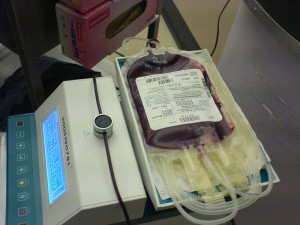Podcast: Play in new window
BOB HIRSHON (host):
Refreshing stored blood. I’m Bob Hirshon and this is Science Update.

Blood transfusions, while sometimes necessary, carry their own risk of organ failure, heart attack, and death. Case Western University cardiologist Jonathan Stamler suspects that’s because stored blood quickly loses nitric oxide. That’s a chemical signal that opens tiny blood vessels. Without it, the blood can’t deliver oxygen to tissues. In fact, when Stamler’s team gave transfusions of stored blood to animals, the oxygen levels in their tissues actually went down.
JONATHAN STAMLER (Case Western University):
Whereas renitrosylated blood, blood restored in its nitric oxide levels, improved oxygen delivery to tissues. Exactly as you would hope and predict.
HIRSHON:
They also found that ordinary stored blood damaged kidney function, but nitric oxide-infused blood protected it. Stamler adds that the process of refreshing stored blood with nitric oxide isn’t very expensive, and could prevent many otherwise lifesaving transfusions from backfiring. I’m Bob Hirshon for AAAS, the Science Society.
